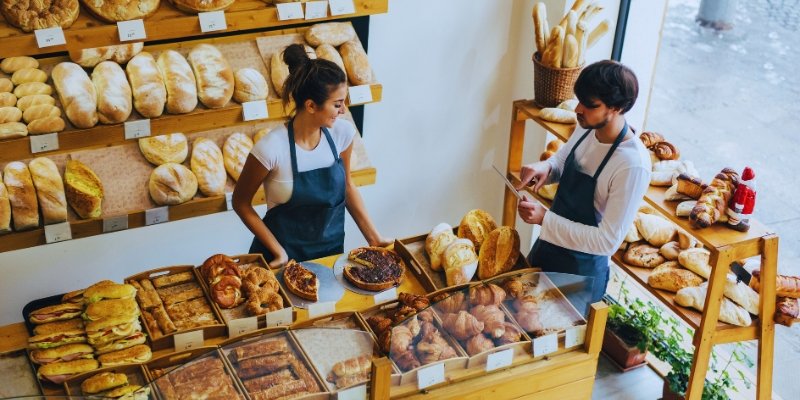Establishing a Bakery Business in Singapore: A Guide for Aspiring Entrepreneurs

Singapore’s vibrant food scene is a melting pot of cultures, flavors, and culinary innovations. Among the most cherished food establishments are bakeries, which not only satisfy the sweet tooth but also serve as community hubs. For aspiring entrepreneurs, establishing a bakery business in Singapore presents a lucrative opportunity, especially when considering the growing popularity of hawker stall businesses. This guide will walk you through the essential steps to set up your bakery, highlighting the unique aspects of the Singaporean market.
Reasons to Start a Bakery Business in Singapore

Starting a bakery business in Singapore offers numerous benefits. First, the demand for baked goods is consistently high, driven by both locals and tourists. Singaporeans enjoy a variety of pastries, bread, and desserts, making it a favorable market for bakers. Additionally, the trend of hawker stall businesses has gained momentum, allowing entrepreneurs to reach a broader audience with lower overhead costs.
Another compelling reason is the supportive government policies aimed at fostering entrepreneurship. The Singaporean government provides various grants and resources for small businesses, including those in the food sector. This creates a conducive environment for new ventures, making it easier for bakers to thrive.
Detailed Steps to Establish a Bakery Business

Conduct Market Research: Understanding the local market is crucial. Identify your target audience, analyze competitors, and explore the types of baked goods that are popular. This research will help you tailor your offerings effectively.
Create a Business Plan: A well-structured business plan outlines your business goals, target market, marketing strategies, and financial projections. It serves as a roadmap for your bakery and is essential if you seek funding.
Choose a Business Structure: Decide on the type of business entity you wish to establish—sole proprietorship, partnership, or private limited company. Each has its legal implications and tax liabilities.
Register Your Business: Register your bakery with the Accounting and Corporate Regulatory Authority (ACRA). This step is crucial for legal compliance and allows you to operate your business officially.
Obtain Necessary Licenses and Permits: In Singapore, food businesses must comply with health and safety regulations. Secure the necessary licenses from the National Environment Agency (NEA) and ensure your bakery meets hygiene standards.
Find a Suitable Location: Location plays a significant role in the success of your bakery. Consider high-traffic areas, such as shopping malls or hawker centers, where footfall is guaranteed.
Design Your Bakery: Create an inviting atmosphere that reflects your brand. The layout should facilitate efficient workflow while providing a pleasant experience for customers.
Source Quality Ingredients: The quality of your baked goods hinges on the ingredients you use. Establish relationships with reliable suppliers to ensure a steady supply of fresh and high-quality materials.
Market Your Bakery: Utilize social media, local advertising, and partnerships with food bloggers to promote your bakery. Highlight unique offerings, such as traditional pastries or innovative creations, to attract customers.
Challenges and Considerations for Both Local and Foreign Entrepreneurs

While the bakery business in Singapore presents exciting opportunities, it also comes with challenges. For local entrepreneurs, navigating the competitive landscape can be daunting. Understanding customer preferences and keeping up with trends is essential for staying relevant.
Foreign entrepreneurs may face additional hurdles, such as understanding local regulations and cultural nuances. Building a network within the local food community can help ease this transition. Furthermore, securing financing and navigating the bureaucratic landscape may require additional effort.
Financial Planning Aspects

Financial planning is a critical component of establishing a bakery. Start by estimating your initial investment, including equipment, ingredients, and rental costs. Create a budget that accounts for both fixed and variable expenses.
Consider potential revenue streams, such as retail sales, catering, and online orders. If you plan to operate a hawker stall business, factor in lower overheads and the potential for high turnover during peak hours. Regularly review your financial performance to make informed decisions about pricing, promotions, and expansion.
Conclusion
Establishing a bakery business in Singapore is an exciting venture with the potential for significant rewards. By conducting thorough research, creating a solid business plan, and navigating the challenges effectively, you can carve a niche in this thriving market. Whether you choose to operate a traditional bakery or a hawker stall business, the key to success lies in quality, creativity, and customer engagement.
If you’re ready to turn your passion for baking into a successful business, contact Company Formation Specialist today. We are here to guide you through the process of establishing your bakery and help you achieve your entrepreneurial dreams in Singapore.
Frequently Asked Questions
1. What are the benefits of starting a bakery business in Singapore?
Answer: Singapore’s high demand for baked goods, supportive government policies, and the popularity of hawker stall businesses make it a lucrative market for aspiring bakers.
2. How do I conduct market research for my bakery business in Singapore?
Answer: Begin by identifying your target audience, analyzing competitors, and researching popular baked goods. This will help you understand local preferences and tailor your offerings accordingly.
3. What business structure should I choose for my bakery?
Answer: You can opt for a sole proprietorship, partnership, or private limited company. Your choice will depend on factors like legal implications, tax liabilities, and the scale of your business.
4. Do I need any licenses or permits to open a bakery in Singapore?
Answer: Yes, bakeries must comply with health and safety regulations. You will need to obtain licenses from the National Environment Agency (NEA) and ensure hygiene standards are met.
5. What are the startup costs for a bakery in Singapore?
Answer: Initial costs include purchasing equipment, ingredients, rental fees, and necessary licenses. It’s important to create a budget that accounts for both fixed and variable expenses.
6. Where should I set up my bakery in Singapore?
Answer: Choose high-traffic locations, such as shopping malls or hawker centers, where you can reach a large customer base. Location plays a crucial role in your bakery’s success.
7. How can I market my bakery business in Singapore?
Answer: Leverage social media, local advertising, and collaborations with food bloggers. Emphasize unique offerings and build a strong brand to attract a loyal customer base.
8. What are some challenges for local and foreign entrepreneurs in the bakery business?
Answer: Local entrepreneurs face intense competition, while foreign entrepreneurs may struggle with understanding local regulations and networking. Staying informed about trends and regulations is essential for success.
9. How can I secure funding for my bakery business?
Answer: Consider exploring government grants, private investors, or small business loans. A well-structured business plan will be crucial when seeking financial support.
10. What are the financial planning aspects of running a bakery?
Answer: Estimate your initial investment costs, plan for fixed and variable expenses, and explore multiple revenue streams such as retail sales, catering, and online orders to ensure profitability.

